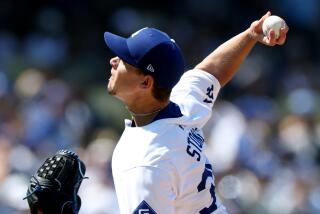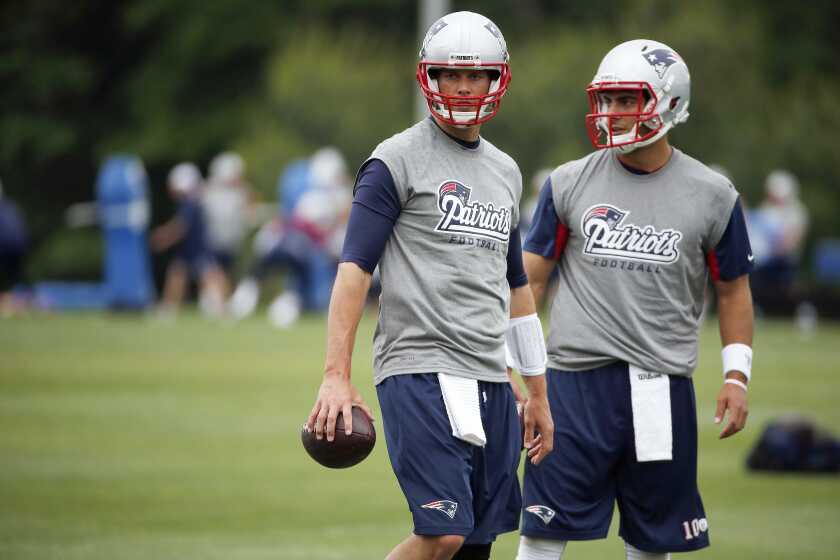Don Drysdale, Hall of Fame Dodger Pitcher, Dies at 56 : Baseball: Fierce right-hander, in Montreal to broadcast a game, apparently suffered a heart attack.
Don Drysdale, Hall of Fame pitcher and Dodger broadcaster, was found dead in his Montreal hotel room Saturday, apparently the victim of a heart attack. He was 56.
During Drysdale’s 14-year baseball career, the fierce 6-foot-6 right-hander, nicknamed “Big D,” compiled a 209-166 record with a career earned-run average of 2.95. He pitched in five World Series and eight Major League All-Star games.
Drysdale’s broadcasting partners, Vin Scully and Ross Porter, were told of Drysdale’s death shortly before Saturday night’s game against the Montreal Expos, but no announcement was made until immediate relatives could be notified.
In the top of the eighth inning, at 7:10 p.m. PDT, Scully made the announcement on the game telecast. By that time, a few other media outlets had begun to report Drysdale’s death.
“Friends, we’ve known each other a long time,” Scully said, “and I’ve had to make a lot of announcements, some more painful than others. But never have I ever been asked to make an announcement that hurts me as much as this one. And I say it to you as best I can with a broken heart.
“Don Drysdale, who had a history of heart trouble--you may remember a couple of years ago he had angioplasty--was found dead in his hotel room, obviously a victim of a heart attack, and had passed away during his sleep.”
A week before, during a night game at Dodger Stadium against the Chicago Cubs, a similar on-air announcement was made--that Hall of Fame catcher Roy Campanella had died of a heart attack at the age of 71.
Lt. Rick Rizzetto of the Montreal Police Department said that Drysdale’s body was found Saturday afternoon, but that a medical examiner estimated the time of death as shortly after midnight, meaning Drysdale had been dead for about 18 hours when his body was discovered.
“He was not on the team bus,” Scully told viewers. “We thought perhaps he had taken a cab. We tried to reach him at the hotel; there was no answer. A little while ago, we found out what had happened.
“To Annie and Donnie and Darren and Drew and all the Drysdale family, our prayers for strength and our tears as well.”
He was elected into baseball’s Hall of Fame on Jan. 10, 1984.
On July 1, 1984, his uniform number, 53, was retired by the Dodgers.
His finest season was 1962, when he was 25-9 and led the National League with 41 starts, 314 1/3 innings and 287 strikeouts. He won the Cy Young Award that season.
He was 23-12 in 1965.
In 1968, Drysdale went 58 2/3 innings without allowing a run, a major league record that stood for 20 years until broken by Orel Hershiser with 59 consecutive shutout innings in 1988. In his streak, Drysdale had six consecutive shutouts, still a major league record.
Some record books, dropping the fraction, simply say Drysdale’s record was 58 innings. Whatever, it was quite an accomplishment.
“When you’re around fans and they start talking baseball, that seems to be the thing they associate with me . . . that and my reputation for being mean, or the fact that I was durable and never missed a turn,” Drysdale wrote in his 1990 book “Once a Bum, Always a Dodger.”
In 1961, Drysdale signed with the Dodgers for $32,000, a salary that made him the highest-paid pitcher in baseball at the age of 24.
During the 1961 season, Drysdale, one of the more feared pitchers of all-time, hit 20 batters in 244 innings, leading the National League in that category for a fourth consecutive season.
Once told to walk a batter intentionally, Drysdale instead hit the batter with a pitch.
“Why waste four of them,” he said with a familiar sneer.
In 1966, he and Sandy Koufax held out on their contracts, seeking at least $100,000 apiece. Reluctantly, the Dodgers gave it to them.
Drysdale was also pretty good with a bat. He hit .300 with seven home runs in 1965. He also hit seven homers in 1958 and had 29 for his career, second in National League history behind Warren Spahn’s 35.
Drysdale was born July 23, 1936, in Van Nuys and was pitching in the majors by the time he was 19.
In his debut with the then-Brooklyn Dodgers on April 24, 1956, he beat the Philadelphia Phillies, 6-1, striking out nine batters, including the first three he faced.
Drysdale was in his sixth season as a Dodger broadcaster and 22nd as a major league announcer.
He first worked as a broadcaster with the Montreal Expos for two seasons (1970-71), spent the 1972 season with the Texas Rangers and joined Dick Enberg with the Angels in 1973.
Drysdale also worked for ABC while with the Angels through the 1979 season. He worked exclusively for ABC in 1980 and then returned to the Angels in 1981.
After the 1981 season, Drysdale was hired by the Chicago White Sox to replace Harry Caray, who had left to do broadcasts of the cross-town Cubs.
Drysdale joined the Dodgers’ three-man broadcasting team in 1988.
He went into broadcasting after retiring from the Dodgers in 1969 because of arm problems.
After the Dodgers moved to Los Angeles in 1958, Drysdale met Ginger Dubberly, 19, of Pasadena, who earlier that year was a Tournament of Roses princess.
Drysdale and Ginger were married Sept. 27, 1958, and had one daughter, Kelly, now 34. The couple divorced in 1969 after 11 years of marriage.
Drysdale met Ann Meyers, a four-time All-American basketball player at UCLA, when he was in the Bahamas in 1979. Meyers was there to compete in a “Superstars” competition for television and Drysdale was there to announce the event for ABC.
Drysdale and Meyers have three children--Don Jr., Darren and Drew Ann. Donnie, as he is called, was born July 23, 1987, exactly 51 years after his father.
Drew, the couple’s third child and first daughter, was born last March 10.
In March, 1989, a group headed by Drysdale purchased the Visalia Oaks of the Class-A California League, and at one time he owned a chain of restaurants called Drysdale’s Dugout. One was in Santa Ana, another in Van Nuys and a third in Hawaii.
Because of his celebrity status, there were several incidents in Drysdale’s life that got considerable media attention.
On May 31, 1982, while an announcer with the White Sox, he was mugged by two men in a hotel elevator in Cleveland. Drysdale suffered cuts and bruises in a scuffle with the muggers, who made off with a gold watch, a gold chain and about $500.
On Sept. 5, 1989, he was robbed of a Rolex watch and his Hall of Fame ring and other jewelry at a Houston hotel by two women who drugged him, police said.
On Jan. 21, 1992, he was arrested and charged with driving under the influence of alcohol after being involved in a traffic accident near Universal City. A blood-alcohol test gave a reading of 0.19%. The legal limit is 0.08%.
But mostly, he will be remembered as an athlete of considerable celebrity.
In 1968, Drysdale, near the end of his record-setting shutout streak, pitched his record-tying fifth consecutive shutout on the day of the California presidential primary. The winner of the primary, Robert F. Kennedy, congratulated Drysdale for that achievement in his victory speech. A short time later, Kennedy was assassinated in the kitchen of the Ambassador Hotel.
* RELATED STORIES: C1-C3
More to Read
Go beyond the scoreboard
Get the latest on L.A.'s teams in the daily Sports Report newsletter.
You may occasionally receive promotional content from the Los Angeles Times.










